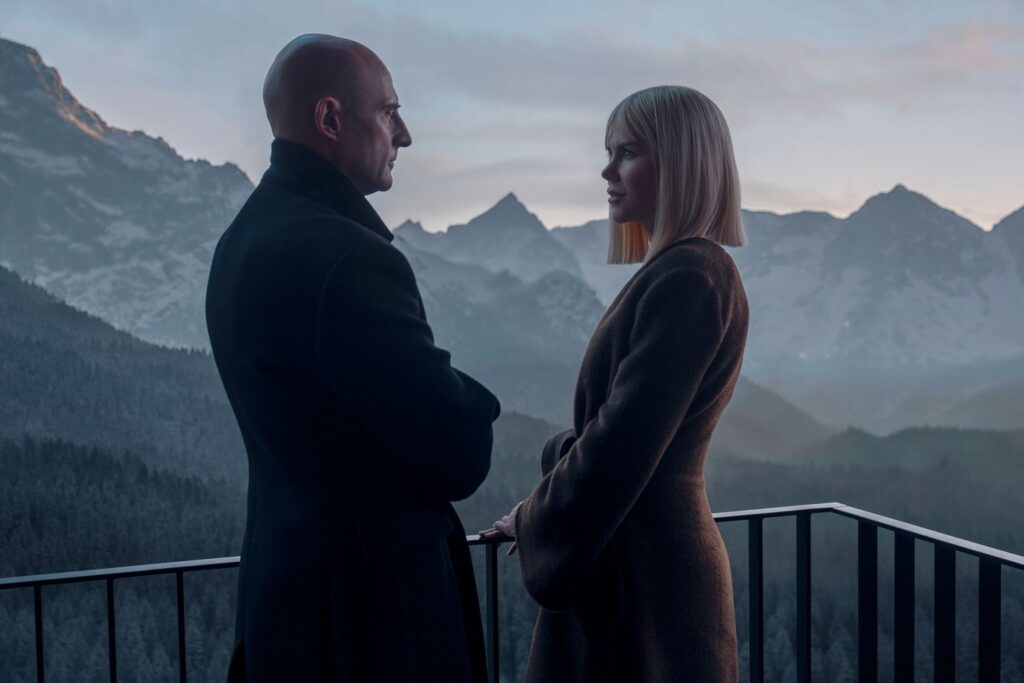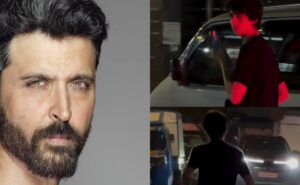
It’s been slowly happening over the past five episodes, but with “Prague,” it becomes official: Nine Perfect Strangers jumped the shark. The set-up for this week was that Masha was going to use her hallucinogenic skills to introduce Tatiana to her father, the guest David Sharpe. It was an enticing notion because it would take us one layer deeper into the madness that is Masha; Tatiana is a figment of Masha’s drugged imagination, and the effort of combining her hallucination with David’s had the potential of finally driving her over the edge. I imagined that Masha was going to lose it, once and for all — and maybe that process would reveal something new about her.
But the show has built a shield around Masha to protect her against setbacks, obstacles, or surprises. By the end of this tonally confused, narratively misguided exploration of her past with David, the only thing that has changed is that David, once hesitant and skeptical, is now all in with Masha. He is awed by her methods, convinced that “more people need to experience this.” Knowing Zauberwald is in financial trouble, he wants to help. He is sorry Masha has had to carry guilt and grief alone all of these years and wants to take retroactive responsibility for his late, estranged daughter. He even wants to have sex with Masha. He wants to hold her.
By this point, we’ve had to put our hands up and accept that this show operates mostly in the past — the first season was more adept at creating dynamism between the characters at Tranquillum House, in part because it literally showed them together more often. So far, season two’s episodes have alternated between Zauberwald interludes and flashback sequences that explain what has landed each character at the psychedelic retreat. I’ve brought up the downsides of this backward-looking method repeatedly in my recaps. Up until now, though, those flashbacks, while frustrating, were explaining something about the characters, if crudely: this is why Sister Agnes blames herself; this is why Brian feels so ashamed. As David relives his past with Masha through the device she has invented for this explicit purpose, what do we really learn about them?
Well, we learn a lot, but none of it seems to matter for the present. Had we not discovered that Masha — who, I guess, is Czech, not Russian — may have been the target of Russian military intelligence forces — stay with me — would that have made any difference at all in the way we understand her? This is the difference between revealing and adding: in order to reveal something, you have to pull back. No amount of added twists in Masha’s past can make her present bearing more compelling. I only wish the Strangers writers’ room would look at the situation they have at hand — nine strangers at a psychedelic wellness retreat under the care of a slightly gonzo but very beautiful guru — with the same dedication they have to writing character backstories.
So, how did we get here? When we open on “Prague,” Masha is waiting for David in his room, where she asks him if he’s up for going on an “advanced psychedelic journey.” In last week’s episode, she told Martin that the drug-fueled-time-travel device she designed still needed to be tested before being used on the guests, and — unbeknownst to Martin, of course — she chose David to be the guinea pig. After having him lie down in the dark, she triggers his memory by telling the story of when they first met.
From here on out, the episode alternates between the extended flashback sequence of their meeting in 2001 in Prague and the present at Zauberwald, where every once in a while, David wakes up to process the memories he has just relived. Masha monitors his vital signs and reassures him that it’s “normal to dip in and out of the hallucination.” To lull him back into the hallucination after he wakes up, she uses sensory triggers: the smell of cigarette smoke or coffee, the sound of a television news program, and its images. In one of the episode’s more bizarre moments, David lies helplessly, tripping through his past as she chants: “This feeling is totally normal.”
When Masha and David first met, she wasn’t Masha Dmitrichenko; she was Mila Zarutskova, a young producer for a Czech news program who charmed David with her acid wit and confidence. He’d been called to speak about the role of his company in repairing relations between Western economies and former Soviet countries like the Czech Republic. Their meet-cute on set leads them to a bar, where Masha tells David that she wants to be a journalist, the first of three careers that will improbably cross continents and fields, from journalism to girlbossism to wellness guruism.
Masha and David spend a nice night together in a swanky hotel room. We learn that, with the passage of time, something has hardened in David: in 2001, he was taken to calling an 11-year-old Peter to say good night, no matter where he was in the world. That softer side of him emerges in Zauberwald as he tells Masha that he’s never forgotten their night together. Before he gets too sentimental, Masha asks to “take him” somewhere else. She ups the dosage, describes the feeling of intense pain in his core, and sings the same lullaby she used to put Tatiana to sleep. When he wakes up, he’s in a hospital, looking at Masha holding their baby. She tells the nurse, in front of David, that Tatina’s father is unknown.
In his room at Zauberwald, David asks Masha a very good question. Why did she never tell him about Tatiana? They seemed to have had a memorable enough connection that it would’ve justified her reaching out, but Masha explains that she didn’t want his money and wanted to teach her daughter to be independent. This is a prime example of how this backstory-fest ends up flattening rather than complicating the characters. David’s question opens up a world of narrative possibility: What if she did reach out to him, and he didn’t answer? What if something about their night together had been less than romantic, and she wanted to distance herself from him? What if she found out something about him that repelled her? What if he did something bad? What if she did?
Instead, things take a turn for the even more confusing. Masha is telling David about seeing him years later in Prague. She found out he was going to be in town and hoped to make contact, but he walked right past her without recognizing her, immersed as he was in conversation with one Sergei Ivanov. As we’re watching Mila watch David, he looks right at her, as if suspended from the hallucination, and says: “What is this story you made up? You’ve read too many Cold War spy novels, Masha; I think this is all in your mind.” She retorts: “We are in my mind now, and this is very real.” This calls into question the whole of the bizarre espionage thriller that is about to unfold. Is Masha fabricating these memories in order to punish David, just as Helena suspected? Toward what purpose besides emotional terrorism? Could any of this get any more insane?
It seems like we’ll have to wait for confirmation that this is all part of Masha’s demented plan, but the short of it is that Mila, now a newspaper journalist, resolved to find out who Ivanov was and expose his shady military contract work as an extremely roundabout way of getting back to David. But she got too close for comfort: Ivanov saw her face and put a target on her back. Scary guys began watching her house and following her in cars.
Mila changed her name — supposedly, that’s when she became Masha Dmitrichenko — and moved — to Russia? So, closer to Ivanov and his goons? — but it wasn’t enough to dodge their surveillance. Desperate, she reached out to David for help. When her calls went unanswered, she threatened to expose his illegal dealings with Ivanov, who’d been sanctioned by the United Kingdom. But her pleas never reached him — in the present, he speculates that his “business associates,” who field contact attempts, must have kept them secret from him — and ultimately, Tatiana ended up paying the price. The suggestion here is that the Russians killed Tatiana as a way to punish Masha, which seems startlingly cruel even for vague Russian villains. Or, they meant to kill Masha and ended up running over Tatiana instead. The logic of the sequence we’ve come to know so well over the course of two seasons — on a snowy path, Tatiana rides her bicycle while a flanneled Masha follows cheerfully behind — wavers: first, it seems like Masha is walking ahead of Tatiana, then it’s like they switch positions so Tatiana is out in front. By this point, though, that’s splitting hairs.
At the very end of the episode, it’s revealed that Martin has been watching and listening to this whole exchange, sex and all, through the room’s hidden cameras. He even stays for the part when, after waking up for good, David tells Masha that he wants to invest in her method and take retroactive accountability for some of the things that have happened to her, which would be difficult, given the gamut of hardship she has been through. A quick recap: single motherhood; being tracked by the Russians and running from the Russians, maybe?; lost a daughter to a tragic accident; survived attempted murder; held careers as a journalist, a girl boss, and a wellness guru. Despite all of this, I don’t feel any closer to knowing who this character is at all. She is an amalgamation of events, hardly a person. The episode closes without Tatiana ever “meeting” David, the purpose of this whole trip in the first place.
Und So Weiter
• One upside of this episode was Nicole Kidman’s performance in the Prague sequences. Freed from having to act like she already knows everything that is about to happen, and given the room to discover — a crush on David, the vulnerability of sharing your desires with a stranger, the openness of youth — it finally feels like we’re watching Kidman work rather than just voice lines. One of her best traits as an actress is the hair-raising, feline quality of her eyes: painted all black, they take on a sort of deranged quality, like Bambi gone crazy. It made me think of that phenomenal scene from Jonathan Glazer’s Birth when, watching an opera, the whole range of human emotion passes through her eyes as the camera holds fast on her face.
• The only glimpse of other guests we get on “Prague” is through Brian Tumkin’s Crabapple Clubhouse; when Masha gets home one night, Tatiana is watching the show on the TV and practicing her English. Absurdly, the episode features a young Tina telling Brian she wants to be an astronaut.
It’s another flashback-heavy episode that answers questions about Masha’s history, but I’m still no closer to understanding who this character is.































































